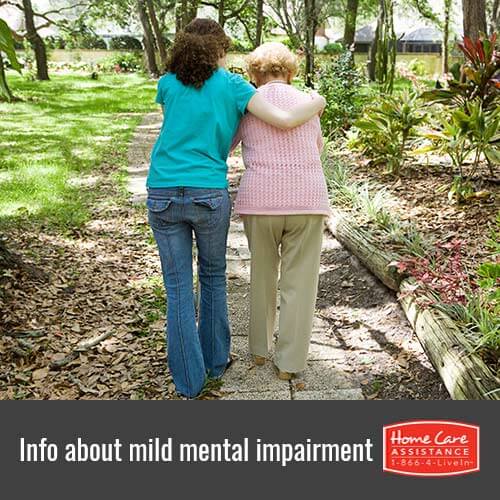Slight changes in memory and thinking skills are to be expected when entering the senior years. Though some seniors eventually develop dementia or Alzheimer’s, it isn’t always an immediate leap from normal changes in cognition to these more serious conditions. A condition known as mild cognitive impairment sometimes acts as an intermediate stage between the two. To offer you a better understanding of mild cognitive impairment, Anchorage home care experts share some facts about the condition and offer tips on how to help your aging loved one prevent its progression.
What Is Mild Cognitive Impairment?
Mild cognitive impairment (MCI) causes cognitive changes that are serious enough to be noticed but aren’t severe enough to interrupt daily life. The condition is broken down into two categories: amnestic MCI and nonamnestic MCI. With amnestic MCI, seniors may forget appointments, special dates, conversations, and recent events they normally would remember. Those with nonamnestic MCI may have difficulty making decisions, judging time, and recalling the steps needed to complete a complex task. According to the Alzheimer’s Association, 10 to 20 percent of people over age 65 have one form of MCI.
How Is MCI Related to Alzheimer’s Disease?
Though MCI is not a form of dementia, approximately 10 to 15 percent of people with MCI will later develop Alzheimer’s disease or another form of dementia. If your loved one has been diagnosed with MCI, he or she should view it as an opportunity to live a healthier lifestyle to prevent the condition from progressing.
How Can Seniors Decrease Their Risk of MCI?
Many of the same activities critical for keeping your loved one’s heart healthy are also beneficial for his or her brain. This is because damage to blood vessels can decrease the amount of blood and oxygen the brain receives, increasing the risk of MCI and dementia. Regular exercise can help your loved one’s brain get a boost of oxygen, keeping it healthy. The Mediterranean diet, which emphasizes eating fish, whole grains, fruits, vegetables, and healthy fats, has proven especially beneficial for maintaining a healthy brain. Doing puzzles and word games and reading regularly can keep your loved one’s brain stimulated and decrease his or her risk of the condition progressing.
There are currently no medications available to treat MCI. You can actively help your loved one decrease his or her risk by exercising together, making sure he or she has access to healthy foods, and providing mentally stimulating activities. Additionally, experts recommend seniors with MCI be reevaluated every 6 months to monitor for changes in the condition. Make sure your loved one attends all of his or her doctor appointments and remind him or her if he or she is prone to forgetting dates.
If your loved one needs help maintaining good cognitive health, reach out to Anchorage Home Care Assistance. We are a leading provider of Alzheimer’s, dementia, and post-stroke care Anchorage seniors can count on, and our caregivers are available around the clock to provide mental stimulation, assist with exercise, prepare nutritious meals, and help with many other important tasks. For more information and to schedule a free in-home consultation, call (907) 770-0907 today.
